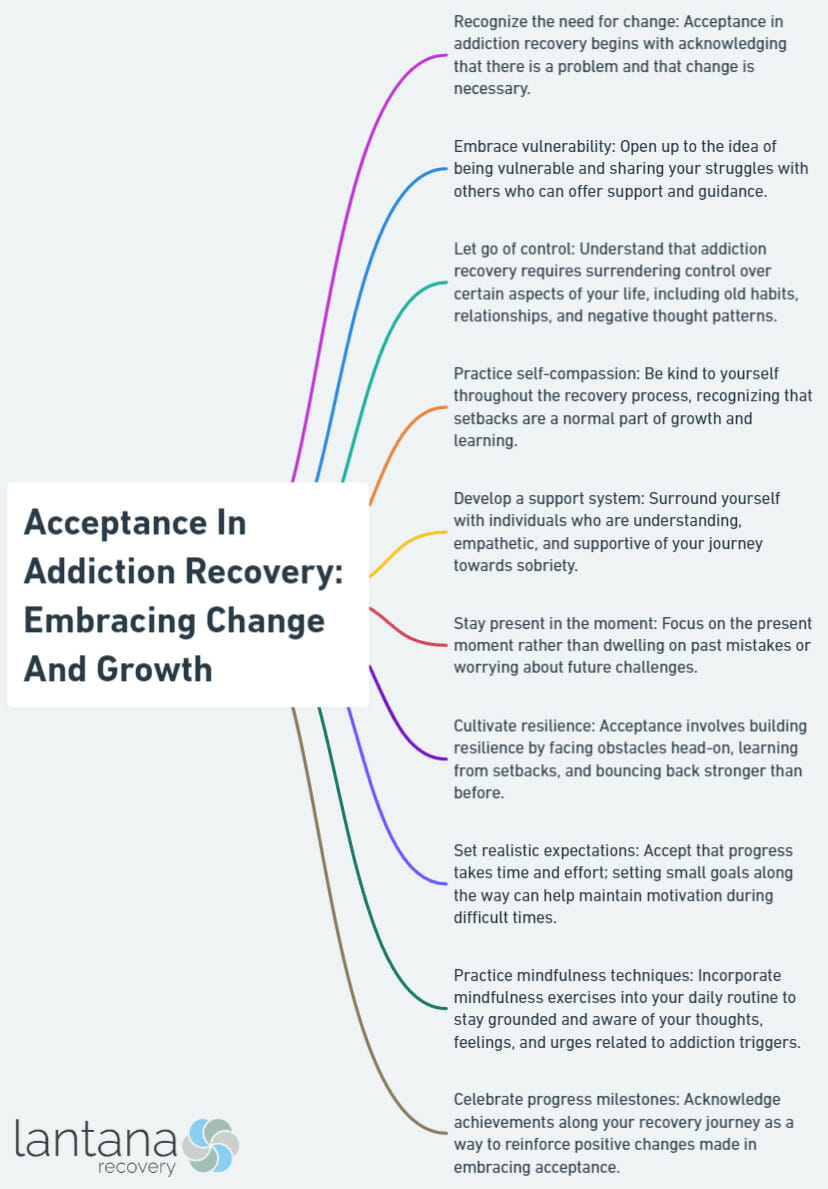Addiction recovery is a challenging journey that requires individuals to face their past, confront their habits, and embrace change in order to rebuild their lives. Central to this process is the concept of acceptance – the willingness to acknowledge the effects of addiction and let go of control. By understanding and embracing acceptance, individuals in recovery can experience personal growth, transformation, and a path toward lasting change. This article explores the significance of acceptance in addiction recovery, the process of embracing change, and the benefits it brings. it discusses overcoming resistance to acceptance and highlights the positive impact acceptance can have on reducing stress, improving self-compassion, and fostering healthy relationships.

Understanding Acceptance in Addiction Recovery
Understanding acceptance in addiction recovery is crucial. Here are some key points to consider:
- Understanding acceptance as a process: Accepting addiction and the need for recovery is an ongoing process. It involves acknowledging the problem, taking responsibility for actions, and being willing to make changes.
- Letting go of denial and embracing acceptance: Denial is a common barrier to recovery. Through acceptance, individuals can break free from denial and confront the reality of addiction. This is an essential step towards making lasting changes.
- Embracing vulnerability in the recovery journey: Acceptance requires individuals to be open and vulnerable with themselves and others. It means acknowledging weaknesses and seeking support from loved ones, therapists, or support groups.
- Facing emotions head-on during recovery: Addiction serves as a way to numb difficult emotions. Acceptance in recovery involves learning to face and process these emotions and develop healthy coping mechanisms.
- Taking ownership of the recovery journey: Acceptance empowers individuals to take control of their recovery. It means actively participating in treatment programs, and therapy sessions, and making lifestyle changes.
- Cultivating self-compassion: Acceptance involves showing kindness, understanding, and forgiveness to oneself. It’s important to recognize that addiction is a disease and recovery takes time. Self-compassion can help stay motivated and committed.
- Celebrating milestones along the recovery journey: Recognizing and celebrating progress along the recovery journey is vital for maintaining motivation and reinforcing acceptance. Each milestone achieved signifies growth and commitment to change.
By understanding acceptance in addiction recovery, individuals can cultivate a mindset that fosters growth, resilience, and lasting change. It is through acceptance that individuals can embrace a new and healthier way of living.

The Importance of Embracing Change
Change is at the heart of addiction recovery, and embracing it is crucial for progress and growth. In this section, we’ll explore the significance of embracing change in the recovery journey. From recognizing the need for change to understanding the role of acceptance in the recovery process, we’ll uncover the transformative power that comes with embracing the inevitable shifts that accompany addiction recovery. So, let’s dive into why embracing change is essential for a successful path to recovery.
Recognizing the Need for Change
Recognizing the need for change is crucial in addiction recovery. It involves acknowledging that your current behaviors and circumstances no longer serve you and that a shift is necessary for growth and healing. Here are key factors to consider when recognizing the need for change:
1. Self-reflection: Assess your life honestly and identify negative patterns or destructive behaviors that contribute to your addiction. This self-awareness is essential in realizing the need for change.
2. Impact of addiction: Understand the detrimental effects that addiction has on your physical and mental well-being, relationships, and overall quality of life. Recognizing these consequences can motivate positive changes.
3. Desire for a better future: Embrace the vision of a healthier and happier life. Recognize that change is possible and can lead to a more fulfilling future. This vision will fuel your determination to take action.
4. Seeking support: Reach out to loved ones, professional counselors, or support groups who can help you navigate the process of change. Explore resources like NPR Addiction Recovery, books, podcasts, and other educational content. Surrounding yourself with a supportive network is crucial in recognizing and embracing the need for change.
Recognizing the need for change requires honesty, self-reflection, and a desire for a better future. By understanding the negative impact of addiction and seeking support, you set yourself on a path toward recovery and growth.
Pro-tip: Keep a journal to document your thoughts and emotions as you recognize the need for change. This can serve as a valuable tool for reflection and tracking your progress in addiction recovery.
The Role of Acceptance in the Recovery Process
The role of acceptance is crucial in the recovery process for individuals struggling with addiction. Acceptance involves acknowledging and facing the reality of one’s addiction and its impact on their life. It allows individuals to let go of control and open themselves up to growth and transformation.
By accepting their addiction, individuals can acknowledge its effects on their life and those around them. Acceptance also leads to personal development and self-reflection, which are essential for lasting recovery. It helps individuals build a supportive network of friends, family, and professionals.
Furthermore, acceptance enables individuals to set goals and establish new habits that promote a healthier lifestyle. It helps overcome resistance such as fear and denial, addressing feelings of shame and guilt that hinder recovery.
The benefits of acceptance in addiction recovery are significant. It reduces stress and anxiety, increases self-compassion and forgiveness, and improves relationships and communication. The Role of Acceptance in the Recovery Process is vital for individuals striving to overcome addiction.

The Process of Acceptance in Addiction Recovery
In addiction recovery, the process of acceptance is integral to embracing change and achieving personal growth. This section takes us on a journey through the various stages of acceptance as they pertain to addiction recovery. From acknowledging the profound effects of addiction to relinquishing control and embracing vulnerability, we will delve into the transformative power of acceptance in paving the path toward healing and recovery.
Acknowledging the Effects of Addiction
Acknowledging the Effects of Addiction is crucial for addiction recovery. It involves recognizing and accepting the negative impact addiction has on various aspects of one’s life.
1. Physical Effects: Addiction can harm the body, causing health issues like liver damage, heart problems, and respiratory issues. Acknowledging these effects is crucial for understanding the toll addiction takes on the body.
2. Mental and Emotional Effects: Addiction often affects mental health, leading to anxiety, depression, and other disorders. It can also impact relationships, work performance, and overall well-being. Recognizing and acknowledging these effects helps in effectively addressing them during recovery.
3. Social Effects: Addiction strains relationships with family, friends, and colleagues, leading to isolation, loss of trust, and damaged connections. By acknowledging the impact of addiction on social interactions, individuals can work towards rebuilding and repairing these relationships.
4. Financial Effects: Addiction has significant financial consequences, including mounting debts, loss of employment, and legal issues. Understanding and acknowledging the financial ramifications of addiction can motivate individuals to seek help and make positive changes in their lives.
Acknowledging the effects of addiction helps individuals take responsibility for their actions and make a conscious effort to overcome them. It is important to seek support from professionals and loved ones during this process to ensure a successful recovery journey.
To support recovery, consider joining a support group, engaging in therapy, and surrounding yourself with a strong support network. You may want to explore groups that have similar beliefs to you as the influence of spirituality on mental health and addiction is explored in diverse cultural and clinical contexts, revealing both favorable results which was discussed in pp 125-140 of Recent Developments in Alcoholism: The Concept of Spirituality in Relation to Addiction Recovery and General Psychiatry by Marc Galanter. Take small steps towards rebuilding relationships, setting financial goals, and prioritizing self-care. Recovery is a process, and acknowledging the effects of addiction is the first step toward a healthier and more fulfilling life.
Letting Go of Control
Letting go of control is crucial in addiction recovery. It involves relinquishing the need to constantly be in charge and accepting that there are certain things we cannot control. By surrendering to the fact that addiction is a disease and accepting that we cannot control our past actions or the actions of others, individuals in recovery can experience freedom and relief:
- Surrendering allows us to focus on our own recovery and make positive changes in our lives.
- Trusting the process is another important aspect of letting go of control in addiction recovery. Recovery requires patience and faith. By trusting in the process, individuals can let go of micromanaging their lives and instead focus on personal growth and healing.
- Letting go of control involves accepting that we cannot change the past. Dwelling on past mistakes or regrets only hinders progress in recovery. By accepting our past and forgiving ourselves, we can move forward and focus on a brighter future.
Studies have shown that practicing mindfulness and letting go of control can significantly reduce stress and anxiety levels in individuals in addiction recovery.
Embracing Vulnerability
Embracing vulnerability is crucial in addiction recovery. It is important for individuals to openly acknowledge and accept their vulnerability, as it helps them uncover underlying issues that contributed to their addiction. This process of embracing vulnerability promotes not only personal growth and healing but also fosters connection and support from others. By allowing oneself to be vulnerable, individuals encourage self-acceptance and build resilience. It may be a difficult journey, but incorporating vulnerability into the recovery process can lead to profound growth and transformation. It is essential to have a supportive network and to seek professional help when necessary.
Taking inspiration from Jake, who openly shared his struggles and fears during group therapy sessions, we learn the power of vulnerability in connecting with others and receiving invaluable support. Through this openness, Jake gained insights into his triggers and found a sense of belonging and hope in his recovery journey.

Growth and Transformation in Addiction Recovery
In the world of addiction recovery, the journey towards growth and transformation is a path paved with personal development, building a supportive network, and setting goals that lead to the establishment of new habits. Get ready to dive into the power of self-reflection, the importance of having a strong support system, and the transformative potential of setting and achieving meaningful goals. It’s time to embrace change and embark on a journey toward a healthier, more fulfilling life.
Personal Development and Self-Reflection
Personal development and self-reflection are essential components of addiction recovery. They play a vital role in acknowledging and comprehending your thoughts, feelings, and actions associated with addiction.
By reflecting on past experiences, you can gain a deeper understanding of the root causes of your addiction and make more informed choices. It is crucial to establish specific and attainable goals to provide a clear direction and keep yourself motivated throughout your recovery journey. Additionally, it is important to continuously acquire new skills and knowledge to enhance your resilience and adaptability.
Make self-care a priority, taking care of your physical, emotional, and mental well-being. Remember that change takes time, so be patient and stay committed to your recovery process, and don’t forget to celebrate even the smallest victories. A study of recovery factor about drug addiction recovery by Kondo et al., has shown a noteworthy positive partial correlation between the acceptance of ‘spirituality’ and attitudes toward drugs, along with the cultivation of positive and effective coping skills. This underscores the crucial role of embracing spirituality in the journey of recovering from drug dependence.
Building a Supportive Network
Building a supportive network is crucial in addiction recovery. A strong support system, consisting of trustworthy individuals, attending support groups, seeking professional help from Lantana Recovery, participating in aftercare programs, engaging in healthy relationships, and communicating openly, provides encouragement, understanding, and guidance. By diligently incorporating these factors, individuals in addiction recovery can find the necessary encouragement and guidance to navigate challenges and achieve long-term sobriety.
Setting Goals and Establishing New Habits
Setting goals and establishing new habits is crucial in addiction recovery. By setting objectives and adopting healthy routines, individuals can focus on personal growth and overcome addiction challenges:
- Establishing daily routines promotes overall well-being. Consistent routines for sleep, exercise, nutrition, and self-care provide structure and stability in recovery.
- To maintain sobriety, it is crucial to eliminate triggers and create supportive environments. Avoiding people, places, and situations that may lead to cravings creates a safer space. Surrounding oneself with a supportive network of friends, family, or fellow recovering individuals is also important.
- Seeking professional help, such as working with a therapist, counselor, or addiction specialist, provides guidance and support in setting goals and establishing healthy habits. These professionals offer coping strategies and accountability.
- Setting goals and establishing new habits requires commitment and perseverance. Embrace change as an opportunity for growth and transformation. With determination and the right support, a fulfilling life in recovery can be achieved.
In a real-life example, John, a recovering addict, set goals and established new habits as part of his recovery journey. His main goals were maintaining sobriety and improving physical health. John achieved these goals by attending support group meetings, seeking therapy, and adopting a balanced diet and exercise routine. He avoided triggers and surrounded himself with supportive friends. With professional help and personal determination, John successfully achieved his goals and established healthy routines. He celebrates each milestone in his recovery, knowing that setting goals and establishing new habits have been instrumental in his journey toward a fulfilling and addiction-free life.
Overcoming Resistance to Acceptance
When it comes to addiction recovery, acceptance plays a vital role in the journey toward change and growth. “Passionate self-acceptance is defined as an intrinsic quality characterized by devoted courage to rise above negative messages, prioritize positive relationships, and fully embrace all aspects of oneself” (Self-Acceptance and Its Role in Women’s Recovery from Addiction, Payne, 2010.) In this section, we will tackle the challenge of overcoming resistance to acceptance. Brace yourself as we dive into the sub-sections that explore facing fear and denial head-on, as well as addressing the daunting emotions of shame and guilt. Get ready to confront the barriers that hinder progress and discover the power of embracing acceptance.
Facing Fear and Denial
Facing fear and denial is a critical aspect of addiction recovery. It is essential for individuals to confront their deepest fears and acknowledge the presence of denial in their lives.
By actively facing fear, individuals can start breaking down the barriers that have kept them trapped in addiction. They must directly confront fear, without avoiding or suppressing it.
Denial acts as a defense mechanism, shielding individuals from the reality of their addiction. Letting go of denial can be difficult as it involves recognizing the negative consequences of their actions. However, by confronting denial, individuals can take responsibility for their behavior and comprehend its impact on their lives and those around them.
Facing fear and denial requires bravery and a willingness to explore one’s emotions. It involves understanding that fear and denial hinder personal growth and recovery. By addressing these emotions, individuals can liberate themselves from addiction and take steps towards a healthier and more fulfilling life.
In addiction recovery, confronting fear and denial is not an easy task, but it is necessary for genuine transformation and lasting change. It is through this process that individuals can confront their addiction, accept the need for change, and embark on a new journey toward healing and recovery.
Addressing Shame and Guilt
Addressing Shame and Guilt is crucial in addiction recovery. These emotions can significantly impact an individual’s ability to heal and move forward. Here are strategies to effectively tackle shame and guilt:
1. Acknowledge and Accept Responsibility: Individuals must recognize their actions and take responsibility for the consequences. By acknowledging past mistakes, it becomes easier to address feelings of shame and guilt.
2. Seek Support: Connecting with a support system is vital in addressing shame and guilt. This can include attending support groups, therapy sessions, or confiding in trustworthy individuals. Sharing experiences with others who have faced similar struggles can help alleviate these emotions.
3. Practice Self-Compassion: Those in recovery often tend to be self-critical. Engaging in self-compassion exercises, such as positive affirmations or self-care activities, can cultivate self-acceptance and forgiveness.
4. Make Amends: Taking steps to make amends for past wrongdoings can help individuals find closure and alleviate guilt. This may involve apologizing to those affected or making restitution where possible.
5. Focus on Growth: Emphasize personal growth and transformation instead of dwelling on past mistakes. By setting goals and establishing new habits, individuals can redirect their energy toward positive and constructive endeavors.
It’s important to remember that addressing shame and guilt is a complex process that requires time and effort. However, by actively working on these emotions, individuals can successfully move forward in their recovery journey.

The Benefits of Acceptance in Addiction Recovery
Acceptance is a powerful tool in addiction recovery, bringing numerous benefits that can truly transform lives. In this section, we explore how embracing acceptance can lead to reduced stress and anxiety, increased self-compassion and forgiveness, and improved relationships and communication. By understanding the profound impact of acceptance in addiction recovery articles and other informative resources on healing and rehabilitation, we pave the way for positive change and growth on the journey to recovery.
Reduced Stress and Anxiety
Reducing stress and anxiety is essential for addiction recovery. Incorporating acceptance can contribute to reduced stress and anxiety in the following ways:
1. Acknowledging addiction’s effects: By accepting the consequences of addiction, individuals can address the underlying causes of stress and anxiety. This self-awareness enables targeted interventions and coping strategies.
2. Letting go of control: Accepting that not everything can be controlled, including the actions of others, can alleviate stress and anxiety. Focusing on what can be changed brings a sense of peace.
3. Embracing vulnerability: Acceptance allows individuals to embrace vulnerability. Seeking support, sharing struggles, and building connections can help reduce stress and anxiety.
In addiction recovery, reducing stress and anxiety is crucial for stability and preventing relapse. Embracing acceptance creates a healthier and more peaceful mindset that supports ongoing recovery.
Increase in Self-Compassion and Forgiveness
An increase in Self-Compassion and Forgiveness is important in addiction recovery with a modern addiction rehab center in Greenville, Lantana Recovery and can lead to personal growth and transformation:
1. Recognizing the importance of self-compassion: Cultivating self-compassion helps individuals in addiction recovery develop understanding and kindness towards themselves. This involves recognizing that addiction is a complex issue and treating oneself with empathy and forgiveness for past mistakes.
2. Embracing forgiveness: Forgiving oneself and others is crucial in the recovery process. It allows individuals to let go of resentment and negative emotions that may contribute to relapse. Forgiveness promotes healing and helps individuals move forward.
3. Developing self-compassion techniques: Engaging in self-care practices like mindfulness, self-reflection, and self-acceptance can enhance self-compassion and forgiveness. These techniques help individuals understand their emotions and experiences better, leading to greater self-compassion and forgiveness.
4. Seeking support: Surrounding oneself with a supportive network can significantly contribute to increasing self-compassion and forgiveness. Sharing experiences, receiving validation, and gaining support from others who have gone through similar struggles enhance the process of self-compassion and forgiveness.
Prioritizing self-compassion and forgiveness in addiction recovery can improve overall well-being and emotional healing. It allows individuals to develop a positive outlook on themselves and their recovery journey, leading to improved relationships and a greater sense of self-worth.
John, a recovering addict, struggled with guilt and shame during his early days of recovery. Through therapy and support groups, he learned the importance of self-compassion and forgiveness. John started practicing self-care and self-reflection techniques, which helped him develop empathy toward himself and recognize that addiction doesn’t define him. This newfound self-compassion allowed him to forgive himself and let go of shame and guilt. As a result, John experienced profound healing and growth in his recovery journey. He became more resilient, developed healthier relationships, and found peace within himself.
Improved Relationships and Communication
Improving relationships and communication is crucial in addiction recovery for personal growth and sobriety. Here are key ways acceptance contributes to this:
1. Enhanced empathy: Acceptance enables individuals to understand others’ experiences and emotions better. By accepting their struggles, they develop compassion and empathy, leading to more meaningful relationships.
2. Effective communication: Acceptance helps develop better communication skills, such as active listening and honest expression. This creates a safe environment for open dialogue and fosters healthier connections.
3. Building trust: Accepting past actions and mistakes leads to taking responsibility and making amends, rebuilding trust with loved ones, and promoting stronger relationships.
4. Resolving conflicts: Accepting personal flaws and mistakes facilitates addressing conflicts constructively. Ownership, sincere apologies, and working towards resolutions prioritize growth and understanding.
5. Boundary-setting: Acceptance empowers individuals to identify and communicate boundaries in relationships. Understanding needs establishes healthy boundaries, promoting respect and enhancing relationships.
Improving relationships and communication is a continuous journey in addiction recovery. Embracing acceptance cultivates healthier connections, effective self-expression, and supportive environments, contributing to overall well-being and long-term recovery.

Frequently Asked Questions
How can a recovering person manage the ups and downs of addiction recovery?
Managing the ups and downs in addiction recovery involves choosing positive responses to challenges and recognizing negative thoughts. It is important to have a support system, such as a counselor, sponsor, or friend in recovery, to provide perspective and advice. Additionally, practicing self-awareness and accepting and adapting to change are important skills for a recovering person.
Why is embracing change important in addiction recovery?
Embracing change is crucial in addiction recovery as it allows for personal growth and the overcoming of challenges. Making the change to live a life in sobriety may be scary in the beginning, but it is necessary for developing new habits, breaking free from old patterns, and achieving a sense of well-being. Change is also what keeps life interesting and exciting, maintaining sobriety, and leading to a happy, joyous, and free life.
What are some basic lifestyle changes a recovering person should consider?
Researchers have found that people with addiction need to make lifestyle changes in order to succeed in recovery. This includes changing the environment, activities, and people they surround themselves with. Living in the same environment and doing the same things can lead to relapse, so making these changes can help establish new habits and reduce the chances of returning to old habits and behaviors.
How can a recovering person cope with change effectively?
Coping with change in addiction recovery can be challenging, but there are strategies that can help. Attending support groups, seeking counseling, and having a circle of friends in recovery can provide guidance and assistance during times of change. It is important to remember that problems often seem less significant in retrospect and that tough times will pass. Trying to control things outside of one’s realm of control can lead to difficulty accepting change, so it is important to let go of things that cannot be changed.
5. What role does gratitude play in addiction recovery?
Many successfully recovering people express gratitude for the challenges they have faced, as these challenges have led to personal growth and the development of new skills. Living a grateful life can help shift focus from disappointing circumstances to the positive direction in which recovery is leading. It also helps in avoiding beating oneself up over past mistakes and instead embracing constant growth and the pursuit of a better way of living.
How can a concierge addiction treatment center like NorthStar Transitions assist in embracing change and growth?
A concierge addiction treatment center, such as NorthStar Transitions, can provide essential treatment and guidance during the early stages of recovery. Their supportive and personalized approach helps individuals navigate the journey of addiction recovery, making life-altering changes and embracing personal growth. They offer a comprehensive support system, including counselors, sponsors, and friendships, to help individuals attain and maintain sobriety, ultimately leading to a successful and fulfilling life.









